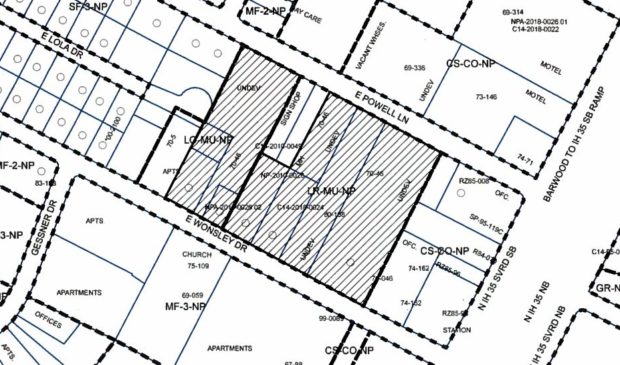Zoning OK’d for affordable housing
Monday, September 24, 2018 by
Jo Clifton With the recently released University of Texas gentrification study on their minds, City Council members on Thursday gave final approval for a zoning change that will allow construction of 258 apartments – including a few three-bedroom units – in North Central Austin. The developer will partner with the Housing Authority of the City of Austin, allowing 85 percent of the units to be rented to people making 60 percent of the median family income or less.
The vote was 8-1, with Council Member Ora Houston dissenting and Council members Delia Garza and Alison Alter away on city business.
District 4 Council Member Greg Casar led the charge to get multifamily zoning for the tract at 411 and 601 E. Powell Lane and six addresses on E. Wonsley Drive, which will become the site of efficiencies as well as one-, two-, and three-bedroom units, according to Alice Glasco, representing the developer JCI Residential LLC.
Neighborhood leader Lisa Hinely asked Council not to approve the zoning change because, as she explained, the neighborhood already has a high concentration of people living in poverty. “I’m asking you not to concentrate poverty,” she said, explaining that the neighborhood’s housing is about 90 percent rental and the majority of residents make about 50 percent of Austin’s median income.
What the neighborhood needs, Hinely said, is more density. There are no grocery stores, just a couple of convenience stores, and the schools would not be attractive to parents with children, she said. The acreage being zoned is the last large piece of property in the neighborhood that might become owner-occupied housing.
But Casar showed that the area is in the early stages of gentrification and the population of the neighborhood will be changing regardless. The city needs to get ahead of that in order to guarantee that the area continues to have affordable housing, he said.
He showed slides indicating how rapidly land values are increasing in the area, which is just west of Interstate 35 and north of Anderson Lane. A standard single-family lot on Powell Lane cost just $20,000 in 2014, but today that lot costs $125,000, Casar said.
In 2014, the developer could have bought the nine lots being rezoned for $536,723, Casar said, but those lots are now valued at $1,709,422.
Nevertheless, the developer has reached an agreement with the city’s housing authority to assist in the development of the affordable units, and Glasco said her client would do outreach to the community to let them know they can apply to live in the new units.
In addition, Glasco said the developer would donate $125,000 to the Austin Parks Foundation for the Georgian Acres Park. The city has set aside money to complete the park, but it is not sufficient and the money from the developer will help close the gap, Casar said.
Casar also pointed out that the Austin Independent School District is preparing to build a brand-new elementary school just across the street from the complex. “The city’s actions in this area in the past have shown underinvestment. I think our Council, because of community organizing as well, is putting more investment in this historically” underinvested area that could unintentionally start to drive even more gentrification, he said.
The answer, he concluded, is planning ahead with subsidized affordable housing, especially since most of the housing in the area is not subsidized and is subject to rent increases at any time.
Mayor Steve Adler agreed with Casar’s analysis, saying while the city does not want to concentrate affordable housing in one area, gentrification is going to hit the area and send prices up, so Council should act to slow down that process.
“And if we wait until the prices go up to try to plan long-term affordability, it will already be too late because it will already be too expensive. … The difference I see between this project and what is there, is that this will assure long-term affordability,” he said.
Houston said she had some compassion for the residents of the neighborhood who seem to be saying, “Thank you for your help, but we need a different kind of help.” She also pointed out that the property is not close to a bus stop, making it more difficult for people to get to work and to grocery stores from there. Council Member Ann Kitchen, a member of the Capital Metropolitan Transportation Authority’s board of directors, indicated that the agency might resolve the problem with a closer bus stop.
This story has been corrected to clarify that Lisa Hinely spoke to the need for more density and housing in the area, not a need for more owner-occupied housing.
The Austin Monitor’s work is made possible by donations from the community. Though our reporting covers donors from time to time, we are careful to keep business and editorial efforts separate while maintaining transparency. A complete list of donors is available here, and our code of ethics is explained here.
You're a community leader
And we’re honored you look to us for serious, in-depth news. You know a strong community needs local and dedicated watchdog reporting. We’re here for you and that won’t change. Now will you take the powerful next step and support our nonprofit news organization?











